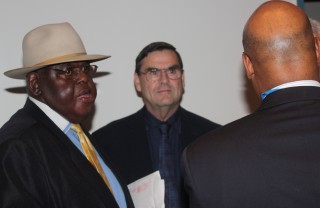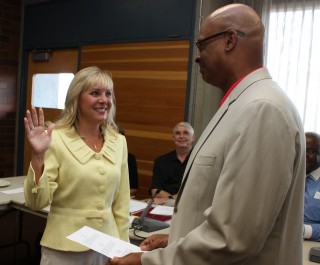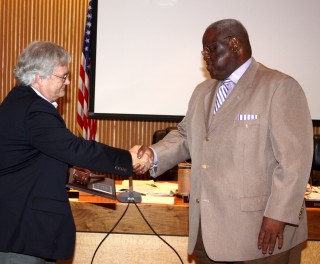This content was published: May 21, 2011. Phone numbers, email addresses, and other information may have changed.
PCC Board incumbents win big
Photos and story by Dana Haynes

Winning re-election on May 17 were, from left, PCC Board members Harold Williams and Bob Palmer, seen speaking to President Preston Pulliams at Thursday's board meeting.
Incumbents have kept their seats on the Portland Community College Board of Directors, with comfortable victories in Tuesday’s election.
In Zone 2, which ranges from North Portland to the east side of Columbia County, incumbent Harold Williams walked to an easy re-election with 47 percent of the vote, according to unofficial final results from Multnomah County Elections officials.

An archive photo of Deanna Palm being sworn in two years ago by PCC District President Preston Pulliams.
Official final results are not expected for several days, as late ballots get tallied.
Williams was appointed to the board in 1990 and was re-elected five times before Tuesday’s vote.
He beat Kitty Harmon with 28 percent; William Peterson with 14 percent and Michael Durrow with an estimated 9.5 percent of the vote. He announced this would be his last term.
In Zone 7, which encompasses the northern part of Washington County and a swatch of Columbia County, incumbent Deanna Palm took 54 percent of the vote, according to Washington County elections officials. Palm, president of the Greater Hillsboro Chamber of Commerce, was appointed to the board in 2009.
She beat Chuck Riley with 40 percent of the vote and Jerry Tobin with slightly less than 6 percent.
In Zone 1, incumbent Bob Palmer ran unopposed and walked away with 95 percent of the vote.
The PCC board of directors has a wide array of responsibilities, including setting the annual budget and establishing policy for the college.
In other unofficial final election news, Clackamas Community College’s $130 million bond measure went down to defeat. The measure would have raised money to renovate classrooms and to build an industrial technology center. According to The Oregonian, nearly two-thirds of voters cast “no” votes for the measure.
“The recent recession and very slow recovery made this a tough election season for Clackamas,” said Preston Pulliams, president of Portland Community College. “The college’s supporters made a good case for their cause, which would have boosted the economy in Clackamas County. They waged a great campaign in spite of the economic upheavals.”
Portland Public Schools was the big story of the day, with the most ambitious educational-based bond measure in Oregon history. The voters narrowly defeated the request for $548 million to rebuild eight schools and renovate scores of other buildings.
The bond measure failed by approximately 48 percent to 52 percent.
Voters simultaneously said “yes” to a separate property tax increase to fund day-to-day operations of Portland Public Schools over the next five years.
Portland’s half-billion-dollar bond measure would have eclipsed the largest education-centered bond measure in Oregon’s history: Portland Community College’s 2008 passage of a $374 million bond measure to purchase land and buildings, to improve technology and to expand all three campuses and the Southeast Center.
Voters on Tuesday appeared to turn down tax increases for the Oregon City and Banks school districts, while OK’ing measures for the Tigard-Tualatin and Parkrose school districts.

